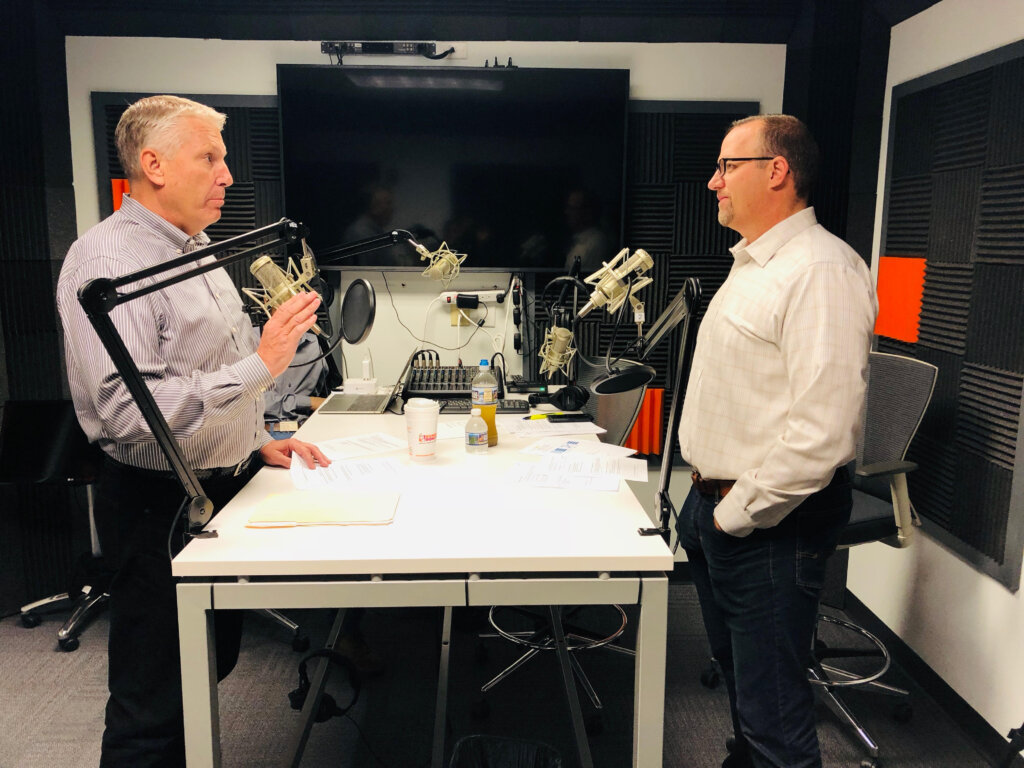Maxwell Executive Leadership Podcast #29: Authentic Leadership is the Core of Any Business Culture

Authenticity is one of the most important factors when it comes to any organization’s culture. What is authenticity and how exactly does it drive culture? In Episode #29 of our Executive Leadership Podcast, Chris Goede and Perry Holley explore authentic leadership, including four simple truths that leaders can apply today.
Do you want to become your most authentic self? Join us for one of our upcoming 5 Levels of Leadership Workshops.
Listen to all podcasts in this series and subscribe to new episodes on iTunes– or Google Play.
Read the transcript below:
Welcome to the John Maxwell Company Executive Leadership Podcast where our goal is to help you increase your level of influence, increase your reputation as a leader, and increase your ability to fully engage your team to drive remarkable results. Hi, I’m Perry Holley, a John Maxwell facilitator and coach and I’m Chris Goede, Vice President of The John Maxwell Company. Welcome and thank you for joining.
Today, we’re going to continue our discussion. This is something that’s talked a lot about around corporate America. We’re going to continue to talk about organizational culture. Today we’re going to talk specifically about the effect that a leader’s authenticity has on culture experienced by everyone inside the organization. You know with the word authenticity and we’re going to dig into this today, there was a Harvard Business Review study that was done and we may have mentioned it before. They talk about doing surveys and finding the top 250 CEOs around the globe, men and women, and finding out what does that attribute about them that’s consistent across all 250? I was completely blown away by this when I learned that about this two years ago. They said iit was and continues to be authenticity is the number one attribute, two to one to the second one. And I thought, man, wow, how powerful that we can be true to who we are, lead authentically and being an effective leader at that level. So that being said, what do we mean by authenticity and how does that drive culture?
Yeah. One of my favorite definitions I saw of authenticity was from a author and speaker, Dr. Lance Secretan, he said authenticity is the alignment — I love this — alignment of your head, heart and feet thinking, saying, feeling and doing the same thing consistently. This builds trust and followers love leaders they can trust. And for me, Chris, I think this alignment is really comparing how I see me versus how others see me. Am I the same person in both cases or am I viewed differently by those that know me versus how I see myself? So when you think about authentic leaders, what are the characteristics? I think we fool ourselves, sometimes. I’m more authentic than you think I am. But, self awareness.
One of our facilitators and consultants, you know Chris Fuller, he talks about a lot of how you were brought that word trust in here he talks about the fact that authenticity is a trust accelerator and trust is the currency in the foundation of all influence and leadership. I mean that right there says why authenticity is so important when it comes to to culture and we could just end the podcast right now and all of you would probably be very excited because it would be less than eight minutes and you would enjoy that. But that right there talking about authenticity and trust is key to the culture and to your point there’s often a big gap between how authentic you think you really are being –t hat’s an intent versus perception gap — and really you how transparent you are or being with us. And I mentioned jokingly with you just a minute ago about self awareness.
But man, if authenticity comes from real self awareness and John says all the time, the hardest person to lead is ourselves because we don’t really know ourselves that well. We make a lot of assumptions and in order for us to really truly lead and become a authentic, we have to know who we are. We have to be self aware, we have to know, you know, where our blind spots are, where our weaknesses are and the fact that we are not going to put on a show. You need to become very comfortable with who you are and I’m and not try to lead like somebody else.
I think most of us coming up through the ranks as you get more and more responsibility put on the expectations of others, I found myself even, I actually worked for an executive once, and I think everybody, our listeners should be thinking of the most authentic leader you’ve ever worked for. Somebody you thought was just the real deal. But this guy had a real habit of always asking others, especially those lower in the organization, what they thought about a problem he was trying to solve. He was always looking for their point of view. He’d say this is what I think, but I’m not the smartest person in the room. What do you think? This always kind of put others at ease and opened the door for them to communicate openly. And the funny thing was he really was the smartest person in the room. He just wouldn’t allow himself to think that. And I just wonder why more leaders don’t do that. I’m finding we tend to want to be the smartest in the room. We want people to think I’m the smartest in the room and I’m not willing to take off my mask and that vulnerability we spoke about before about, hey, I don’t know all the answers. What do you think?
Yeah, because we want to have all the answers. Right? That’s why a lot of leaders don’t do it. They feel like they need to be the smartest person in the room. They need to come in and that command and control and that is exactly opposite of being able to kind of lead a team where that authenticity just kind of oozes out. You don’t need to have all the answers, you know, the way that he led the leader you just talked about. I loved what he did. There’s one small change I would make, which is don’t even let your team know what your thoughts and ideas are before you asked the question because, sometimes you will stifle the room and it will stifle the idea is you won’t get their authentic responses and let the room generate that and then speak into it and say, hey, here’s what I was thinking, but I really loved what I heard from here. And you begin to have that conversation. I know previously on podcasts we’ve talked about the pull for us to be the genius instead of being the genius maker. So talk a little bit more about, you know, that whole process of stepping back so others can step up in order to have a higher engagement with your team.
And to your point about the, don’t give your ideas first, I was just in a session a few weeks ago and the executive, kept doing that is what I think, what do you think? And we had a consultant there and we took a break and get around the coffee potty. I heard the consultant lean over and say, hey, let them go first because the minute you talk, yeah, they’re going to shut down.That was Liz Wiseman’s multipliers on a genius genius maker as a great lesson. I also saw that great philosopher, Dr Phil, said that your authentic self is who you are when you have no fear of judgment. You know, the world starts pushing you around and telling you who you’re supposed to be. Yeah. That’s your fictional self is when you have that mask on. Give yourself permission to be your authentic self. And I found an interesting to said about, give yourself permission to be, it’s okay to be you.
Yeah. We do these RightPath profiles about from the behavioral kind of how you’re wired. It’s one of three buckets that we think are extremely important for you to know about people when leading them. And so we go through this quick assessment, behavioral assessment and it breaks it down into 16 different categories or identifiers. And I remember Greg Kagel, another one of our consultants and facilitators saying people would always come up and say, okay, you’ve coached so many people and you know all their profiles. What’s the best profile of the best leader you’ve ever worked for? What is it? Cause I want to be that profile. And he just starts laughing and he’s like, the best profile for you to be the best leader you can be is your profile.
That’s right. It’s yours. Which leads right into authenticity. So let’s talk about this. What are some ways that we can share with those that are listening about how we can grow and become more authentic for our people? Yeah, let’s go through these quickly. But I think number one, for me, what I’m learning is to just be values driven. I have a clear vision of what I stand for and to whom I’m accountable. And that in today I see a lot of leaders actually not just in the community, that people have this circumstantial values depending on the circumstances that will drive how I act and how I am. And I just want to be, I want to be the same in every situation. If I’m true to my values and we’ve spoken about that on many podcasts is I’m true to my values, then I’m probably going to be the same and living my values in every situation, no matter what comes.
Yeah. The word that comes to mind when you said that was consistency. I think people are drawn to consistent leaders, you know, and think that if you can become that same person and you’re authentic and you’re consistent, they will see that. So, all right. Number two, we talked a little bit about this man. You have to become self aware. Do you know, do your words match your actions? Right? Does your audio and video sync up, right? Like you need to make sure that you’re self aware and you’re not saying one thing and you’re acting another way cause they’re just going to check out on you. There can be like, yeah, no, you’re not authentic at all.
So, number three was be being respected versus being liked to smile at this because when I was a very first time, the first line manager, one of the senior guys said you’re interested in more than being liked than being respected. So true. If I hadn’t been the new guy, I might have punched him. But I think many of us tend to side on that being liked and doing things that people respond to positively. If I can keep authentic, it opens the door to really do the right things. You know, be true to my truth itself and just just okay to be me again. Why am I trying to be what you need me to be treated myself to my values. Be self aware and lined up.
You know, Mark Cole, our current CEO, and he’s kind of John’s right hand man, he oversees the entire enterprise, all of our different verticals inside our family of companies. He says that to me just a little bit differently. He said, listen, as you continue to grow in your leadership, what you have to make a decision on, and he can only speak to this because we’re kind of wired the same way, you know, the same as as you. And he’s gone through this last couple of years and John speaking directly into him with the more and more responsibility you get as a leader, your desire to lead has to be stronger than your desire to be liked. And that’s hard for relational people. We might have some people that are listening right now that are kind of the Level 3 production tasks. They were like, oh yeah, like that’s it, right?That’s no problem for them. It’s not for me. And so we’re actually kind of working through that. And when I heard you say that, just kind of reminded me of that.
Number four. Finally and just be real. We gave you four very simple handles today. And if you’re not getting anything deep from us, but when you think about authenticity, it’s not deep, right? It’s, it’s simple. It’s how we were wired. So be real and make sure that you’re not embellishing or enhancing not only any accomplishments that maybe you have been blessed to accomplish, but even those that you see accomplishing other things, don’t embellish them. Because when you do that, you lose credibility right away through your team because they’re going, I don’t think he really knows, right? Because that is not what that looked like when it came through the door. So just make sure that you know that you’re real, you don’t embellish yourself, your team. Make sure that, you know, when you have mistakes and you mess up and you have weaknesses, man, just admit them to them.
Yeah. Mine was, I look at the leaders, the one I mentioned earlier that was so open, he shared vulnerabilities. He shared mistakes. He was generally, there’s a real person that was in a high level position. There’s a quiet humility and noticing about people that are comfortable with who they are and that most people would think that that’s really what authentic is about. If the culture you desire, your organization is not really catching on, would you say the first place the leadership look is really at themselves?
Absolutely. Where it starts, right? Whether you’re leading a team, whether you’re leading a department or organization, it starts with you. It starts with kind of the leader or the one with the influence. And you know, the humility. A lot of people are like, wow, you can’t have humility and be a strong leader. I don’t really think they understand what humility means. You know, people will often mistake humility for insecurity or being tentative or you know, maybe not moving fast, all these different things. But it’s really not. You need to understand you can’t do it by yourself and you need help with those around you. And have the humility to be able to accept that. And to speak to that so that your team can be right there with you and understand that you’re being authentic. That’s good stuff. As we wrap it up, maybe a couple of action plans some encouragement to our listeners.
Yeah. A couple of things here as we close, you know, the biggest takeaways I think from today besides these four simple truths, is there is a direct correlation with your authenticity and the success of improving or enhancing the culture of your organization. You need to know that we just mentioned it starts with you. And so if you want to change anything, you have to make sure that you’re changing yourself first. I was reading an article this morning and there was a comment on there from Warren Buffet that I thought was really kind of telling to what we were talking about today. And he goes in there in the article, he says, go to work for someone that you admire the most. And I was like, that’s interesting, right? So what does this look like?
And so he goes on in the article, he talks about, okay, what does that look like? What does someone that you admire look like? And it was interesting because here’s a guy that said they have to be human centered. They have to be a human centered leader, a person willing to be authentic and to connect to the hearts of others. And he goes on, he’s like, man, you’re doing life with people you work with, right? So make sure that those maybe that you’re following you admire him. If not, maybe we need to look at a change. More importantly though, what does it look like to be on the other side of your leadership? Are you leading authentically? Are you leading in a way? Are you doing life with those that you work with where they would look at you and say, hey man, I admire that leader? I admire this about him or her am I or this. And if not, then then it goes back to the self aware. Check yourself because you may need to make some changes in order to improve the culture.
I’m reminded of John’s 21 Laws that people buy into you before they buy into your vision or whatever you’re trying to do, and I thought I got to buy into you if you’re not you. I love it. Also, as a reminder, if you would like to learn more about the 5 Levels of Leadership or perhaps bring a 5 Levels of Leadership Workshop to your organization, please go to JohnMaxwellCompany.com/podcasts. We would also welcome any questions or thoughts you may have about leadership on that site that Perry and I will be able to answer in future podcasts for you. Thank you for joining us. This has been the John Maxwell Company Executive Leadership Podcast.












Be the first to comment on "Maxwell Executive Leadership Podcast #29: Authentic Leadership is the Core of Any Business Culture"